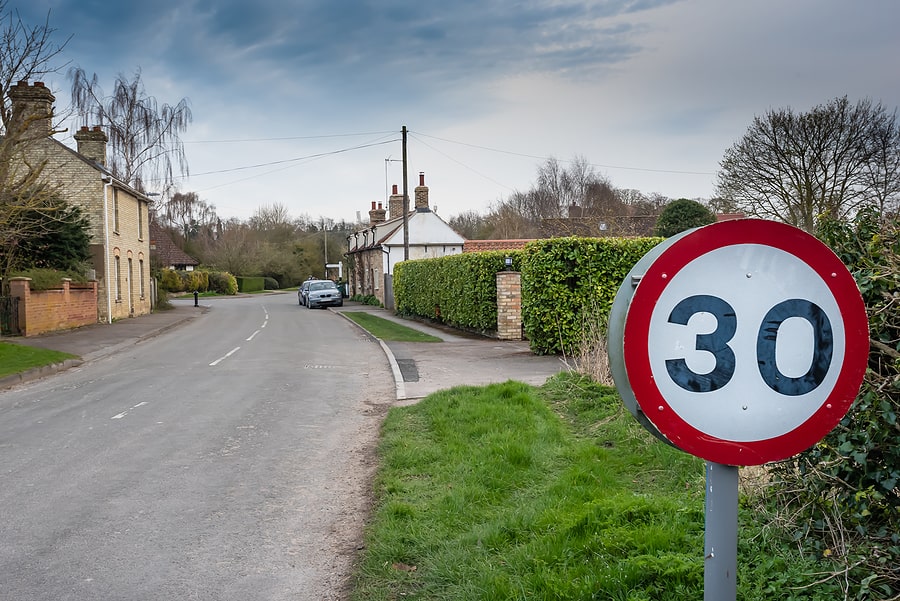Penalties for speeding
Speeding is the UK’s number one motoring offence. The RAC Foundation estimates almost 2.4 million are committed each year – or 17 out of every 20 motoring offences.The penalty for speeding depends on lots of factors: how fast it’s claimed you were going, the speed limit on the road, the type of vehicle, and other variables like whether there was a school or pedestrians nearby.
Your character will also be taken into consideration in any judgement, meaning you may get a lighter fine if you have an unblemished driving record (or face heavier fines if you’re a repeat offender).
- The minimum penalty is a £100 fine and three points on your licence.
- The maximum speeding penalty is a £1000 fine and a driving ban. Or £2500, when speeding on a motorway.
You can check your driving record, including penalty points, on the government’s View Your Licence website.
Any penalties you receive are based on which ‘band’ your speeding falls under:
|
Speed limit (mph) |
Band A |
Band B |
Band C |
|
20 |
21-30 |
31-41 |
41+ |
|
30 |
31-40 |
41-50 |
51+ |
|
40 |
41-55 |
56-65 |
66+ |
|
50 |
51-65 |
66-75 |
76+ |
|
60 |
61-80 |
81-90 |
90+ |
|
70 |
71-90 |
91-100 |
101+ |
Band A
Points: ThreeFine: 25% to 75% of your weekly income
Band B
Points: Four to sixFine: 75% to 125% of your weekly income
OR
Disqualification: Between seven and 28 days
Band C
Points: SixFine: 150% of your weekly income
Or
Disqualification: Between seven and 56 days
In addition to these three bands, certain situations can lead to heftier penalties. This includes speeding in a HGV or while towing a caravan, dangerous driving or while disqualified or on bail, or while in poor road or weather conditions.
Band D
Fine: 200% - 300% of your weekly incomeBand E
Fine: 300% - 500% of your weekly incomeBand F
Fine: 500% - 700% of your weekly incomeWhat happens when you’re caught speeding?
When you’re accused of speeding, the process is largely the same, whether you’re caught by the police or a speed camera.Caught by a speed camera
If car is snapped by a speed camera – you’ll recognise two terrifyingly bright flashes as the camera records your plates – you’ll receive a letter within 14 days.This is a ‘Notice of Intended Prosecution’. It includes a Section 172 notice. You must return this to the police, declaring who was driving the car at the time of the offence. Failing to respond could see you end up in court.
Once your Section 172 Notice is processed, look out for either a letter inviting you to court or a Fixed Penalty Notice.
Caught by the police
If the police catch you speeding, you won’t get a ‘Notice of Intended Prosecution’. Instead, they may give you a verbal warning, send you a Fixed Penalty Notice, or send a letter ordering you to go to court.After you’ve received a Fixed Penalty Notice
Once you’ve got a Fixed Penalty Notice, you must plead guilty or not guilty.If you dispute the speeding charge, talk to a solicitor as soon as you can, as you don’t want to make the wrong plea and jeopardise a potential case.
Pleading guilty
When you plead guilty, you’ll need to pay at least a £100 fine and points are placed on your licence.However, the police or court may instead decide to send you on a speed awareness course – so long as you haven’t been on one in the last three years.
Pleading not guilty
When you plead not guilty, you’ll be taken to court. And if the court finds you guilty, your fine and penalty points can be increased. You could also lose your licence.Speeding offence legal ‘myths’
Two ‘myths’ about speeding endure: that you’re allowed to break the speed limit by around 10% and that if the police fail to send a Notice of Intended Prosecution within 14 days, the charge is dropped.Neither, strictly speaking, are true.
As far as the law’s concerned, if you go even 1mph above the speed limit, you’re guilty. While the National Police Chiefs’ Council recommends giving drivers a leeway of ‘10% plus 2mph’, it’s exactly that – a recommendation.
If you haven’t received a speeding ticket within 14 days, you shouldn’t assume you’re in the clear. The police only need to prove that they sent the notice within the 14-day timeframe, and that no unusual events, like a postal strike, prevented you from receiving it.
But if the Notice of Intended Prosecution is issued 14 days after the incident, you do have grounds to appeal the ticket.
Related article: Is it ever ok to speed in the UK?
What to do if you dispute a speeding offence
There are few reasons why you may dispute the charge of speeding. It might be that you can prove you weren’t driving at the time, or that road signs were obstructed (although ‘I didn’t know what the speed limit was’ isn’t a valid excuse).A driving offence solicitor will be able to help you determine how to respond to an unfair speeding ticket. It’s worth doing, especially given the impact of getting penalty points or losing your licence. And how many times have we seen reports of cameras inaccurately recording vehicle speeds?
The Law Superstore lets you connect, compare, and choose the best legal experts to sort out your speeding ticket. Just use our quick quote form to find a solicitor near you that’s right for your case and your budget.






